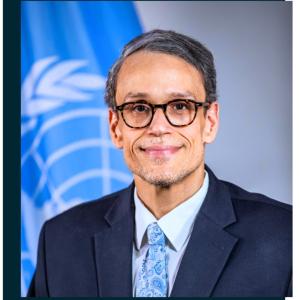Honourable Minister of the Interior,
Solicitor General & Legal Secretary and Representative of the Ministry of Justice,
Representative of the Office of the National Security,
Her Excellency, Ambassador, Head of the Delegation of the European Union to The Gambia,
Colleagues from the United Nations System,
Dear Participants, CSO, the media
All Protocols duly respected,
It is an honour and great pleasure to welcome you to the validation workshop of
- The Roadmap to mainstream human rights and gender in the fight against Transnational Organized Crime (TOC) in The Gambia,
- The Standard Operating Procedures (SOPs) for law enforcement officers on the investigation of torture cases, and
- The Guidelines for the prevention and prohibition of torture.
This workshop represents an important step in ensuring that The Gambia’s criminal justice system aligns with international human rights standards, particularly in the transitional justice context.
Today’s validation builds upon previous milestones, including a Stakeholder Meeting held in October 2023 to mainstream human rights and gender into the investigations and prosecutions of transnational organized crime, and a Training of Trainers workshop on the Prevention and Prohibition of Torture, organized in March 2024.
These processes led to the development of a Roadmap on human rights and gender in the fight against transnational organized crime.
The Roadmap outlines ten practical and actionable areas to ensure that investigations and prosecutions related to transnational organized crime are conducted in full respect of human rights standards.
These areas include, among others:
- Strengthening legal frameworks on international drug trafficking in compliance with international human rights standards;
- Enhancing coordination within the criminal justice chain to effectively combat international drug trafficking, while safeguarding the rights of both accused persons and victims;
- Promoting the use of special investigative techniques to combat transnational organized crime;
- Leveraging the work of human rights and professional standard units of Drug Law Enforcement Agency of The Gambia, the Gambia Police and the Gambia Prison Services to strengthen accountability and the rule of law;
- Ensuring sustainability of the fight against transnational organized crime and improving victims’ access to compensation;
- Promoting the use of international cooperation in the investigation and prosecution of transnational organized crime.
Therefore, the scope is vast and calls for coordinated efforts among national stakeholders to achieve tangible and sustainable results.
Furthermore, participants emphasized the need for Standard Operating Procedures and Guidelines on the Prevention and Prohibition of Torture as essential tools to strengthen institutional accountability.
These tools aim at equipping law enforcement officers with clear and consistent procedures for handling allegations of torture, in line with the Torture Act 2023 and The Gambia’s human rights international obligations.
The draft documents submitted for your review offer an opportunity to engage in meaningful dialogue, share best practices, and explore how human rights and gender considerations can be more effectively integrated into your daily professional responsibilities.
Ladies and Gentlemen,
I commend the Ministry of Justice, the Ministry of the Interior, our law enforcement and oversight bodies, civil society partners, and the European Union for your unwavering commitment to justice, accountability, and the protection of human dignity.
The UN System in The Gambia remains fully committed to supporting national institutions in promoting a human rights-centered approach to governance, justice, and security.
This joint initiative, led by the United Nations Office on Drugs and Crime (UNODC) with financial support from the European Union, forms part of the UN’s broader contribution to strengthening the rule of law and upholding human rights in alignment with The Gambia’s national development priorities.
Ultimately, the validation of these key documents marks a significant milestone in our collective efforts to advance the Sustainable Development Goals (SDGs), particularly SDG 16 on peace, justice, and strong institutions, and SDG 5 and SDG 10, which call for gender equality and reduced inequalities.
We look forward to the adoption of these tools as part of a long-term roadmap for inclusive, rights-based reforms in the security and justice sectors of The Gambia.
I wish you a productive and insightful meeting. Thank you for your kind attention./-





